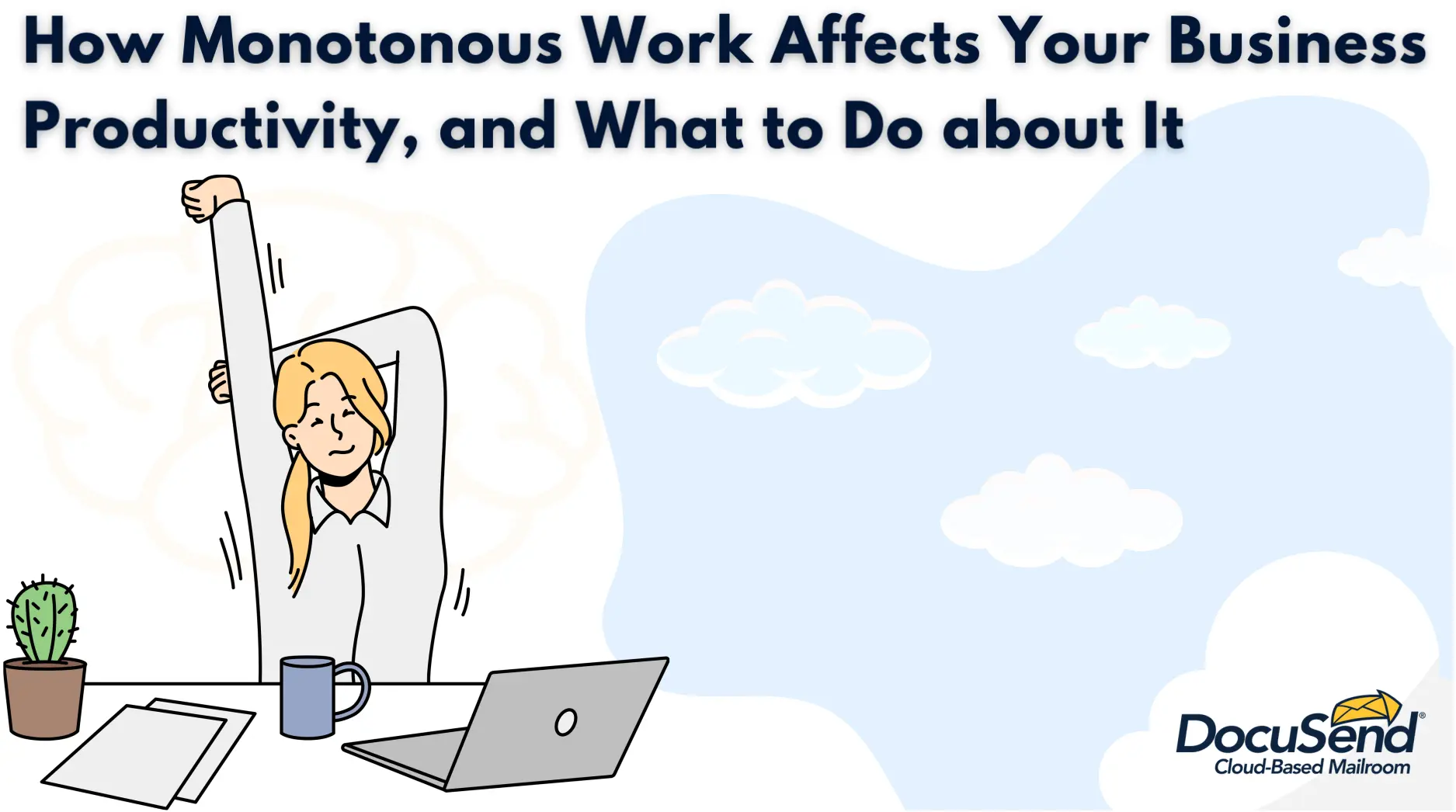How Monotonous Work Affects Your Business Productivity, and What to Do about It
Nataliia Popova. DocuSend, powered by MTI
Even the most-loved job can suddenly become routine, because even if you like the job itself, every occupation has dull elements in it. Repetitive actions and tasks are present in everyone’s professional life to some extent, whether you are an artist, an athlete, or a business owner.
And it can influence your brain, making you change your attitude toward work.
Sometimes you will find that you no longer work with the same concentration and productivity, and the monotony at work kills your ability to engage in creative thinking. You may try to fix it by negotiating with yourself: “I just need to сheer up, find more motivation...” However, many studies show that repetitive, routine activities affect us on a physiological level.
This article gives some tips on how to deal with monotony in your daily work. I tried them and found them helpful—hopefully you will too.
There Is a Variety of Ways to Get Tired
Of course, all work of long duration is tiring, but tiring in totally different ways. Let’s imagine an artist carving a statue in marble, who has been working all day. In addition to the heavy physical activity, they have also had to stay focused for a long time and calculate the proportions in advance, so at the end of the day, the person is tired, but still happy and inspired. Another day the same artist needs to сast a hundred small copies of this statue. This means that the same set of movements must be repeated for hours.
What happens?
Over time, there comes increasing tension and loss of concentration, and if the artist doesn’t take enough breaks, some of the sculptures may end up with defects.
When you think of the different kinds of tiredness, you probably think of the two most common first: physical, then also mental fatigue, which can have many different reasons, from long stimulation of your brain with complicated tasks to stress.
However, there are cases when you feel tired and fed up with your work due to doing the same thing over and over again, but neither hard physical work nor intense brain activity was involved. Scientists distinguish the effect of monotony as a separate type of fatigue.
Too Much or Not Enough?
Long story short, monotony is a lack of variety, a lack of new impressions you get. The sameness of actions plays a crucial role in emotional fatigue, which in turn makes you feel tired. So, it’s quite the opposite of being tired because of the workload: it’s because you automatically perform well-known and repetitive operations and don’t get sufficient stimulation of the neurons in your cerebral cortex. Doing monotonous tasks for too long leads to bad memory and poor attention; therefore, it is very easy to make a mistake at any moment.
So, Why Is Your Brain Falling Asleep?
Your brain needs to receive new stimulations all the time you are awake. A diversity of impressions is a crucial biological need, not limited to the human brain only: animals that make their way to the same place of feeding every day tend to use a few different routes for no obvious reason.
The brain quickly gets used to the same repeated stimulation, and switches to sleep mode. That’s what the studies show. Scanning the brains of people performing monotonous tasks for a long time reveals a lack of integration between the two brain hemispheres: the entire load is transferred to one of them, while the other is “sleeping.” It was also discovered that the brain’s activity decreases approximately half a minute before focus is lost and the first mistake is made—that’s when active thinking and involvement leaves us.
On the Brink of an Error
That’s exactly what happened to a friend of mine some years ago when she worked at a magazine and stuffed thousands of envelopes with notices to subscribers (because they didn’t use an online mail outsourcing service like DocuSend). She suddenly realized she couldn’t find an advertising contract with a big client, which she had been recently holding in her hands and which the boss had to urgently sign and send back their copy to the client with a carrier. A few hours of stuffing and sealing envelopes had done their job. After a few more hours, spent in stress and searching, the document was dug out of one of many envelope piles.
Anyone can drown in monotonous work just like that contract drowned in the envelopes. You can be reviewing a document for your company’s website, and suddenly notice that you have been looking at the same sentence on the screen for several minutes!
But there are some things you can do about it…
How Do You Overcome Monotonous Work?

How to Refresh Your Brain?
Of course, you still must complete your daily tasks, but you can restart your brain from time to time, creating an additional influx of new impulses. If you feel like you are getting bored, here are some ideas that may help.
Take Breaks Every Half Hour, and Micro Breaks Whenever You Need Them
Sometimes working more hours does not mean accomplishing more in the end. When the brain has not been refreshed for a long time with a break, it begins to work more slowly. Conversely, when you start tasks after a break with renewed force, you work better and with more attention, so you complete the tasks faster.
Frequent small breaks for a few minutes every half hour, during which the brain rests, have a more fruitful effect on your efficiency and the quality of the result than working steadily without interruptions. So, the loss of time for this is not as big and scary as you might think. You will lose even less time from micro breaks: frequent refreshing pauses of just 30 seconds, which you can do at any time when you feel that tension is increasing. Just direct your sight out the window at passing clouds or cars, stand up and stretch, or close your eyes and think about something pleasant. In addition to relieving tension, it also helps to avoid blurred vision, caused by long-term focus on the same thing.
Aim for a change of impressions during the break: try something new — research the meaning of a phrase in a foreign language, text your friend or go out and breathe the fresh air for a few minutes.
Make Small Changes in Your Environment
Monotony can be reduced by changing some factors around you, such as the set of items on your desk, the decor in the room, the office lighting, or the place of work itself (if possible, try working part of the time in a different room). Add more details to the interior—a strict business style or minimalism is good, but our eyes need something to catch on.
It will be great if you can turn on music; it is a cheat code in the fight against monotony. Although there is a belief that it is distracting, the additional stimuli it creates in your brain allow you to stay in the moment, here and now, preventing you from sinking into yourself during monotonous work. If the music does distract you, take a short break to listen to one of your favorite tracks, and return to work in an improved mood.
It works in the same way if you take some kind of snack or drink with you to the workplace, so don't be too hard on yourself if you sip coffee or chew candy while you're at work.
Alternate the impressions from the new, eye-catching items on your desk, music, or a new taste in your mouth.
Automate and Outsource All That Can Be Automated and Outsourced
There are types of routines you don’t even need to struggle with because you can just delegate them. You may perform secondary activities that are not related to the goals that really matter. New technologies provide automation of many tasks, so you can focus on the things that are most important. For example, I found that using a speech-to-text app instead of just sitting and typing is really helpful, because you can concentrate on your thoughts instead of symbols on the screen.
And if you need to get rid of your monotonous mailing routine, and finally stop printing and folding documents and stuffing them in envelopes, you can just upload documents to the DocuSend online print-to-mail solution, which does all that for you. There is no need to spend effort on what the third party can do, especially when it doesn’t require any contracts and can save you up to half your mailing costs.
Don’t Keep Your Schedule the Same Day by Day
When every day is too predictable, it is not inspiring at all, because the whole intrigue disappears. It looks just like in the movie Groundhog Day! Try to change your habits: shift the activities you usually do at one time to another time, change the order of tasks, shift your break times or go to a new place for a lunch break. Try doing something you haven’t done before.
You can also write a step-by-step plan for your day including even the smallest details. The purpose is to divide the big tasks into smaller steps to get a feeling of joy every time you accomplish one of them. Instead of thinking of the whole task, write something like: 1) Switch on the computer. 2) Open the first document. 3) Review it. 4) Mark the most important…and so on. Your brain likes to tick these many small points, because it receives the reward hormone dopamine, which greatly affects our motivation and productivity.
Try to Look at Things from a New Perspective
When I was a child and helped my parents to clean the yard on our property after a heavy snowfall, I remember that I got really bored. To combat this, I imagined that the snow was actually a great big mound of ice cream, and the shovel was a big spoon. It made the process really interesting. I'm not calling you to go crazy but playing with your imagination and your perception of daily tasks is a really helpful method to beat monotony. Maybe you are not just creating the report on quarterly expenses but writing an epic chronicle about what happened lately in your realm of business.
It’s also helpful to keep reminding yourself why you are doing what you’re doing. Imagine the future in all its details—it can be either the results of the work you’re implementing or the financial reward you will get for it.
During Your Free Time, Make Sure You Really Get Enough Rest
To be truly resistant to monotony, you need to keep your brain fresh. For that, you need to spread your time between job and rest wisely. On the weekends you should leave thoughts about work behind (no matter how obvious it may sound) and enjoy new impressions and activities. Remembering these will help raise your mood during the monotonous routines.
Until recently, life coaches and successful influencers have promoted the idea that you should not spend a lot of time resting and sleeping, because every free minute is an opportunity to learn or do something. When you just sit on the beach and drag a blade of grass along the sand, watching how it leaves a mark, in the past it was perceived as a waste of time and opportunities.
But the truth is that we need moments of complete relaxation, when we aren’t doing anything. Although we don’t see the processes that happen in our brain during relaxation and sleep, they are very important. When we think we are doing nothing, our brain is recovering and preparing for a new, productive week.
Conclusion
Remember, you are not alone in your struggle—monotony is something most people complain about, and something you can improve by mixing the things you need to do with the things you just love. By implementing the tips that are most suitable to your situation, you can develop your own strategy to overcome boredom and raise motivation.
Do you have any other boredom-busters that work for you? Share them in the Comments section.

